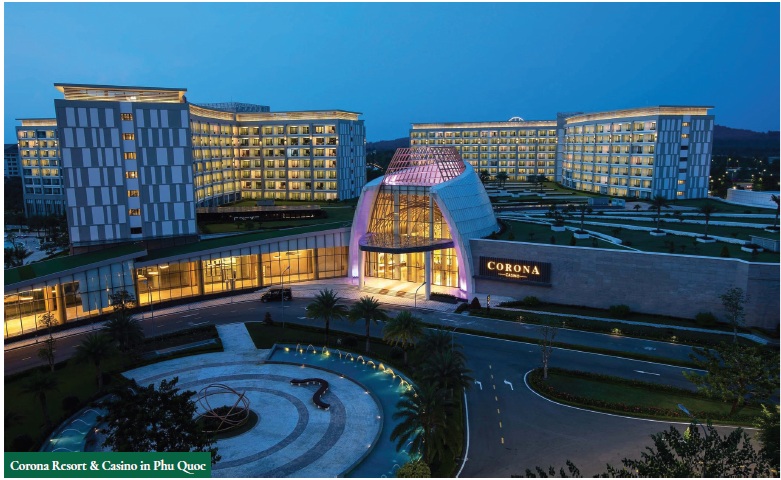At the Threshold. By Shaun McCamley
Vietnam’s journey with casino-gaming legislation has been marked by cautious experimentation, significant foreign investment and evolving regulatory frameworks. As of May 2025, the nation’s approach reflects a balance between economic aspirations and social considerations. This article delves into the historical context, current landscape and future prospects of casino gaming legislation in Vietnam, and how the country’s unique political structure plays a pivotal role in shaping gaming policy.
From Prohibition to Pilot Programs
Historically, gambling in Vietnam was largely prohibited, with only state-run lotteries being legal. The government viewed gambling as a vice that threatened the moral fabric of society. However, as neighboring countries like Cambodia, the Philippines and Macao began reaping the economic benefits of integrated resorts and gaming revenues, Vietnam faced increasing pressure to liberalize its stance.
Early Gambling Restrictions
Before 2017, Vietnamese citizens were banned from entering casinos. Foreigners could gamble at certain locations but locals were strictly excluded, a policy that inadvertently fueled the growth of illegal gambling dens and capital outflows to neighboring countries where Vietnamese could gamble openly.
The issuance of Decree No. 03/2017/ND-CP marked a legislative breakthrough. The decree launched a three-year pilot program, allowing eligible Vietnamese citizens to gamble in approved casinos. This was complemented by Decree No. 06/2017/ND-CP, which legalized betting on international football matches, horse racing and greyhound racing under strict regulations.
To qualify, Vietnamese gamblers needed to be over 21, have a monthly income of at least VND10 million (US$400) and pay an entry fee. Casinos were required to report participant data to the Ministry of Finance and local authorities, with comprehensive social-impact assessments mandated.
The Corona Casino Pilot Program
The first and only venue to participate in the pilot program was the Corona Resort & Casino, on Phu Quoc Island. Opened in 2019, it became the focal point of the government’s experiment in liberalizing local access to gaming. Despite initial skepticism,
the program reportedly attracted thousands of local players, generating significant tax revenues and creating jobs. Nevertheless, industry insiders shared a contrasting perspective, highlighting that the property struggles to meet its revenue targets and faces several challenges that impede its ability to generate income.
Concerns about transparency and accountability have continued to exist. The absence of independent audits and the limited disclosure of social-impact assessments have led to doubts regarding the sustainable expansion of access on a national scale.
To understand the evolution of casino gaming legislation in Vietnam, it is essential to grasp the workings of the country’s political structure. Vietnam is a one-party, socialist republic governed by the Communist Party of Vietnam (CPV). The three main
pillars of authority are:
The Politburo
The Politburo stands as the top decision-making body in Vietnam, comprising approximately 18 to 20 senior members of the CPV. This influential group sets policy direction and oversees the implementation of laws across the country. Decisions made by the Politburo significantly shape economic development strategies and play a crucial role in determining whether sectors such as gaming will be expanded. Key members of the Politburo often lead or have a say in national steering committees that oversee sensitive areas like finance, security and public health.
The President and Prime Minister
The president of Vietnam acts as the ceremonial head of state and commander-in-chief of the armed forces. However, real executive power lies with the prime minister, who heads the central government and oversees ministries. The Office of the Prime
Minister plays a central role in implementing policy.
When the Ministry of Finance or Ministry of Planning & Investment develops proposals related to the gaming industry, they must be reviewed by the prime minister’s office before proceeding to the National Assembly or receiving cabinet-level approval. The prime minister can also issue executive decrees, like those enabling the 2017 pilot program.
The National Assembly
Though the National Assembly is Vietnam’s legislative body, its role is often one of formalizing rather than initiating policy. Members of the Politburo, including the prime minister and president, typically guide legislative agendas. Bills are drafted and reviewed
through a consultative process involving ministries, the Communist Party and industry stakeholders, then are passed by the National Assembly. Growth, Caution and Regulatory Complexity Vietnam’s casino industry has seen notable growth
since the launch of the pilot program. Several integrated resorts have emerged as high-profile destinations, primarily serving foreign tourists and expatriates. Yet the regulatory environment remains cautious and fragmented.
Integrated Resorts and Foreign Investment
Vietnam currently hosts over eight licensed casinos, primarily in tourist destinations like Da Nang, Quang Nam and Phu Quoc. Notable developments include:
Hoiana Resort & Golf (Quang Nam): Owned, developed and operated by Hoi An South Development Ltd. (HASD), this integrated resort opened in 2020. It features luxury hotels, golf courses and a gaming floor. Hoiana recently announced a $1 billion expansion to enhance its non-gaming attractions.
Grand Ho Tram Strip (Ba Ria-Vung Tau): One of the earliest integrated resorts, Ho Tram continues to expand with new hotel brands and entertainment offerings. It remains a key case study in foreign investment under Vietnam’s gaming policy.
Van Don Casino Project (Quang Ninh): Touted as a flagship investment in a planned special economic zone, this project has been slow to materialize due to regulatory bottlenecks and strategic uncertainty.
Regulatory Oversight
Vietnam lacks a unified gaming law. Instead, the industry is regulated through decrees issued by the prime minister, guidance from the Ministry of Finance, and various local-level approvals. This fragmented framework creates confusion and slows development.
For example, approval for new casino projects requires multiple layers of consent: provincial approval, ministry-level evaluation and final ratification by the prime minister. The absence of a national gaming commission further complicates enforcement and coordination.
The Suspension of the Pilot Program
As of early 2025, Vietnam’s pilot program allowing local citizens to gamble at Corona Casino (Phú Quốc) remains suspended. The trial ended on December 31, 2024 and Vietnamese nationals have not been allowed to gamble at the casino since January 1, 2025, pending a government decision on whether to renew or terminate the scheme. No official announcement has yet reinstated the program or permanently ended it, meaning it is effectively on hold under the law until further notice. The Ministry of Finance is currently leading this assessment, which is expected to shape future policy decisions.
The Future of Casino Legislation in Vietnam
The future of casino gaming in Vietnam is delicately poised. While economic arguments for expanding the sector are strong, political caution and societal concerns continue to influence policymaking.
Pending Review and Policy Recommendations
The government is expected to publish a comprehensive report in late 2025 reviewing the pilot program’s impact. Early indicators suggest that the program may be extended, potentially with tighter regulatory controls and enhanced transparency. Recommendations may include:
- Expanding local access to multiple casinos under strict conditions
- Establishing a national gaming authority for oversight
- Introducing electronic monitoring systems to track player behavior
- Mandating third-party audits and publishing annual impact reports
International Comparisons and Competitive Pressure
Vietnam's cautious approach contrasts with neighboring jurisdictions such as Cambodia and the Philippines, where gaming legislation is more liberal and investor-friendly. To remain competitive and attract regional tourism, Vietnam may need to modernize its gaming laws and regulatory practices.
Online Gaming and Social Gaming
Vietnam's digital entertainment sector has experienced significant growth, particularly in online gaming. While the government has implemented stringent regulations on online gambling, social gaming has emerged as a thriving segment, operating within a distinct regulatory framework.
Online Gambling Regulations
Online gambling, especially casino-style and card-based games, is officially prohibited in Vietnam. Decree 147, effective from December 25, 2024, enforces this ban and introduces strict measures to prevent unlicensed gaming activities. The decree mandates:
- Ban on Casino-Style and Card-Based Games: These games are ineligible for licensing, aiming to mitigate potential social harms.
- Enhanced Player Verification: All players must verify their identities using Vietnamese mobile-phone numbers.
- Protection for Minors: Players under 16 require parental or guardian information during registration, with gameplay time restrictions for those under 18.
- Compliance for Cross-Border Operators: Foreign gaming companies must establish local operations and adhere to Vietnam’s payment regulations.
These measures reflect the government's commitment to curbing illegal online gambling and protecting vulnerable populations.
The Rise of Social Gaming
In contrast to online gambling, social gaming – games played primarily for entertainment without monetary rewards – has seen substantial growth in Vietnam. This segment includes puzzle games, strategy games and multiplayer online battle arenas (MOBAs).
Social gaming operates under a different regulatory framework:
- Licensing and Oversight: Local Departments of Information & Communications (DICs) are responsible for certifying G2, G3 and G4 games, which encompass most social games.
- Content and Age Restrictions: Games must adhere to content guidelines. Developers are required to implement age-appropriate features, including parental controls.
- Market Growth: The social gaming market in Vietnam is expanding, driven by increased smartphone penetration and a young, tech-savvy population.
The government’s supportive stance towards social gaming, coupled with clear regulations, has fostered an environment conducive to innovation and growth in this sector.
Vietnam’s approach to online gaming distinguishes between gambling and social gaming, enforcing strict regulations on the former while promoting the latter.
This delineation ensures consumer protection and aligns with the country’s cultural and social values. As the digital entertainment landscape continues to evolve, Vietnam’s regulatory framework will play a crucial role in shaping the industry’s future trajectory.
Regional Development and Economic Strategy
Casino gaming is increasingly being integrated into Vietnam’s broader economic development plans, especially in special economic zones. Policymakers view integrated resorts as tools to stimulate infrastructure development, create jobs and generate
tourism revenues.
There is growing support among provincial leaders for expanded gaming rights, especially in coastal provinces like Khanh Hoa, Da Nang and Ba Ria-Vung Tau. However, such initiatives require national-level endorsement, reinforcing the importance of the
Politburo and of prime ministerial backing.
Conclusion
Vietnam’s evolution in casino gaming legislation reflects the broader balancing act of economic liberalization within a tightly controlled political system. The Politburo and Office of the Prime Minister remain central to shaping policy direction, while ministries and provincial authorities execute development strategies. The pilot program for local gamblers was a bold step that yielded economic and employment benefits.
Yet the suspension in late 2024 underscores the government’s commitment to measured, data-driven policy. Future legislation will likely depend on the results of ongoing evaluations and the political will of senior leaders to embrace more liberal reforms.
With a population of nearly 100 million and a growing middle class, Vietnam represents a significant opportunity for gaming investors. However, only those prepared to navigate the complexities of its political and regulatory environment will succeed.
As a 40-year veteran in the Southeast Asian gaming industry and former president of Ho Tram Resort Casino, I believe that Vietnam stands on the threshold of transformative growth. The next decade will determine whether the country can become a regional leader in integrated resort development or remain a cautious participant on the sidelines of Asia’s gaming boom.
***This exclusive feature interview was originally published in Casino Life Magazines May 2025 edition Issue 177***
































